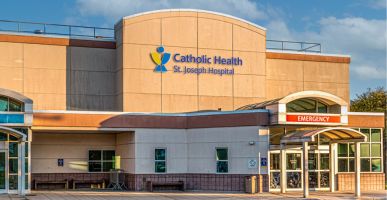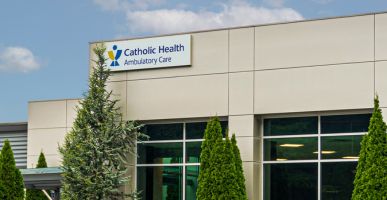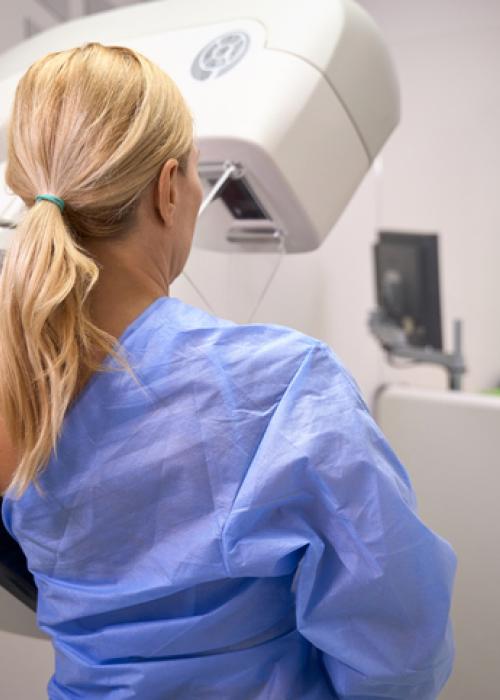Expert Care for Benign Breast Disease & Surgery
At Catholic Health, we understand that breast changes and breast pain can be concerning for women who may think it means they have breast cancer. However, noncancerous breast diseases are often the cause.
Catholic Health breast health specialists across Long Island provide expert care for the diagnosis and treatment of benign, noncancerous breast tumors and diseases. Our compassionate team treats each woman individually. We listen closely to your symptoms and clearly explain the next steps to find the cause, including diagnostic testing.
If diagnosed with a benign breast condition, we tailor a treatment plan for an optimal return to good health. For patients who need non-cancerous breast surgery, mastectomy or breast reduction, our surgeons use the most advanced minimally invasive procedures. Our Catholic Health Cancer Institutes across Long Island provide excellence in breast cancer diagnosis and treatment.
Common Breast Diseases We Treat
Fibroadenomas are the most common noncancerous breast tumors that occur when fibrous tissue and glandular tissue form a mass. A woman can have one or more fibroadenomas in one or both breasts. They typically appear in women in their 20s-30s and shrink after menopause.
A mammogram or breast ultrasound can detect fibroadenomas. They do not increase breast cancer risk and typically do not require treatment. Routine breast exams monitor the fibroadenoma(s) for growth or shrinkage year-to-year.
Breast cysts are noncancerous fluid-filled masses that can change with a menstrual cycle or go away without treatment. A cyst will appear on a mammogram as a lump in breast tissue in one or both breasts. They are common in women 35-50 years old. Breast cysts do not increase breast cancer risk.
Draining a breast cyst is recommended if it causes breast pain and tenderness.
Hyperplasia is an accumulation of cells that line the breast’s milk glands or ducts. Once a mammogram detects hyperplasia, a breast biopsy will be done to diagnose if it is usual hyperplasia or atypical hyperplasia.
Usual hyperplasia shows normal-like cells and typically does not require treatment. Atypical hyperplasia, which shows abnormal cells, is linked to an increased risk for breast cancer. A doctor may recommend surgery to remove the abnormal cells.
A breast papilloma is a noncancerous tumor that grows in the milk ducts of a breast. It appears as a small lump behind or near the nipple and can cause nipple discharge.
A biopsy of a breast papilloma may show atypical cells that increase breast cancer risk. A doctor may recommend surgery to remove the atypical cells, depending on the size of the papilloma and if it is causing pain.
Mastitis is common in women who are breastfeeding. Blocked milk ducts or an infection in the breast causes inflammation of breast tissue with symptoms that include breast pain, swelling, warmth and redness in the breast area.
Mastitis does not increase breast cancer risk and can be relieved with a doctor’s recommendation for antibiotics or over-the-counter medications safe for breastfeeding women.
Diagnostics & Surgery
Catholic Health breast specialists use advanced technology and procedures that provide a precise diagnosis to determine the best treatment options. A doctor may recommend one or more of the following to diagnose breast disease.
- Mammogram (including 3D mammography)
- Breast ultrasound (including 3D ultrasound)
- Breast MRI
- Biopsy
For women who need surgical intervention for breast health conditions, Catholic Health surgeons provide the highest level of expertise for minimally invasive procedures that promote quicker healing and recovery. Procedures include the following.
- Surgery to remove cysts.
- Surgery to remove abnormal or atypical cells.
- Prophylactic mastectomy. Patients who are considered high-risk for breast cancer may elect, with their breast surgeon’s guidance, to remove one or both breasts to lower the risk of developing breast cancer. The surgery does not guarantee a patient will not get breast cancer.
- Breast reconstruction. Typically done by a plastic surgeon at the same time as a breast surgeon does a mastectomy.
- Breast reduction surgery (reduction mammaplasty). Removes excess fat, breast tissue and skin from the breasts.

Why do I have breast pain?
What To Know About Breast Cancer
Comprehensive Breast Cancer Care

Breast Health Services Locations

Good Samaritan University Hospital
West Islip, NY

Mercy Hospital
Rockville Centre, NY

St. Catherine of Siena Hospital
Smithtown, NY

St. Joseph Hospital
Bethpage, NY

Catholic Health Ambulatory Care at East Hills
East Hills, NY







